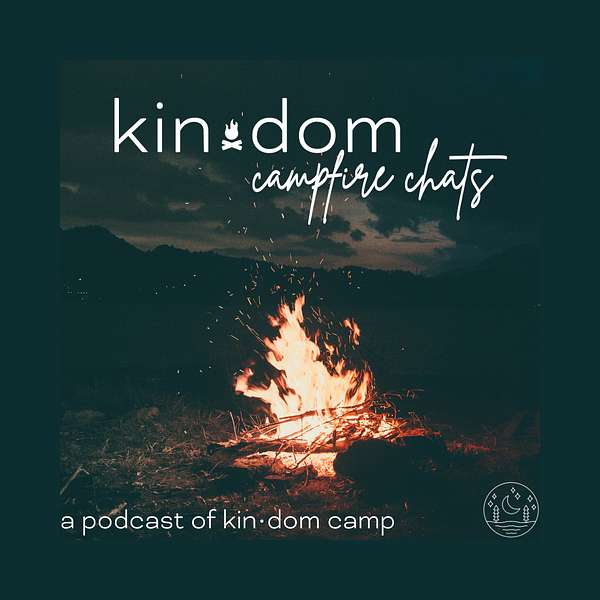
kin•dom campfire chats
kin•dom community is a queer-led organization that creates space for queer belonging and celebration. We host kin•dom camp, a summer camp for LGBTQ+ youth ages 12-17. This podcast tells the stories of our campers in their own words.
kin•dom campfire chats
Trans at School
Use Left/Right to seek, Home/End to jump to start or end. Hold shift to jump forward or backward.
Knowing that being trans was much harder for previous generations, and while not being the first queer person at their school, there were still a lot of societal gender roles to navigate. Even though their school knew how to incorporate a trans person, individual teachers and student can still be difficult.
Find out more about us by visiting our website, kindomcommunity.org. There you can find information about kin•dom camp and consider supporting our work with a one-time or recurring donation. Be sure to follow us on Facebook and Instagram @kindomcommunity to keep up with all the important information.
music 0:00
[Andy strumming guitar & Baylee's voice singing: "Oh let's build, let's build a place we can go”]
Narrator 0:05
Thank you for tuning into kin•dom campfire chats, a podcast of kin•dom community. This podcast features the voices of LGBTQIA+ persons, both youth participants and adult staff, who attended kin•dom camp in Texas in the summer of 2024. We asked the camp participants to think of a question that they wished someone would ask them about their life journey. With a friend, and in their own words, the campers tell their stories of struggle, love, support, and a community found. We invite you to listen with an open mind and an open heart.
music 0:50
[Andy strumming guitar & Baylee's voice singing: "This is the place”]
Speaker 1 0:57
The question is, what is it like being trans in the public school system?
speaker 2 1:02
My shorter answer is that it's hard. It's hard to be trans at a public school. It's definitely not as hard as it used to be, because people are more aware of transgender people and advocacy and like inclusion. I've heard a lot of stories from other trans people who maybe grew up in the 90s or 2000s and it was much harder for them because people weren't as aware, and they were maybe like the first queer person at their school, but I was never really the first queer person at any school I've been to, um, which has made it easier, in a way, but there are still problems and things to fix.
I didn't come out until middle school er come out as trans, but even before that, there was a lot of just gender roles, and we were taught that like, you know, pink is for girls and blue is for boys, not directly, but it was always like, just something that was there. And so when I got to middle school and I came out, I wasn't the first person, and my school sort of knew what to do with me, which was kind of expected, but maybe I expected more, because it is so common these days that you would think that things like this would be treated better, and you know, the teachers would be told about it. But you know, it really varies with every teacher and with every student. It just the reaction to being queer, and sometimes it's great, sometimes they're very supportive, and then sometimes it's the worst, and they are just really horrible about it. And sometimes I don't even blame them, especially like other students, because I know it's just that their parents taught them that, and it's not really coming from them, it's coming from like someone above them and someone that has also been taught things like that. And so I don't necessarily blame them, but that's not the behavior that they should be doing.
Another thing that I feel like a lot of people worry about is like transgender people in bathrooms and they're trying to do bad things. Or like, people are bringing drag queens to school, and they're trying to, like, indoctrinate the children, but none of that is happening, and it's saying things like that is actually having a very negative effect. Because now there is policies and there's legislation that is against something that we barely had in the first place.
music 5:13
[Andy strumming guitar & Baylee's voice singing: "Oh let's build”]
Baylee 5:22
Hi y'all, it's Baylee. I'm the Creative Director of kin•dom community. I’d like to talk a little bit more about kin•dom camp and how you can get involved. kin•dom camp is an opportunity for LGBTQIA+ youth ages 12 to 17 to feel safe and free to show up as their full selves. Campers will have the chance to experience traditional camp activities and recreation, plus some specialized programming to incorporate LGBTQIA+ history and culture. More information can be found on our website kindomcommunity.org/camp. If you have any questions you can't find the answers to, you can email us at kindomcamp@gmail.com.
Thanks for listening to kin•dom campfire chats. We are proud to be a safe space for these campers, and we are even more proud of them for sharing their stories. We hope you'll keep gathering around the campfire with us as we celebrate all of the stories that make us this kin•dom community.

